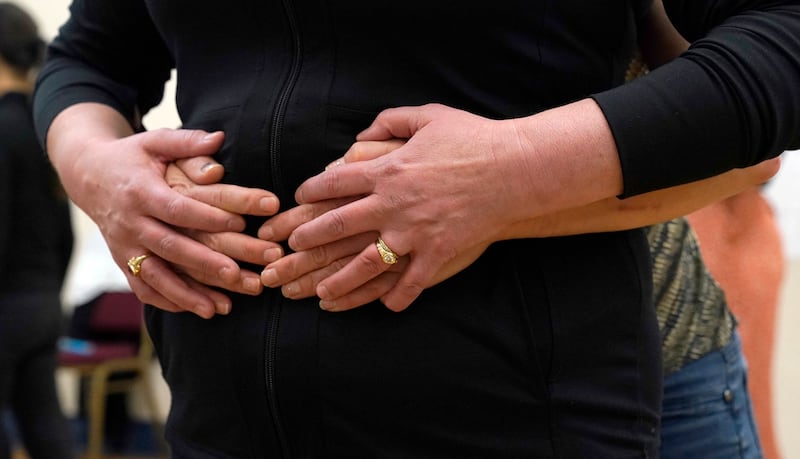PARIS—When Léa Seydoux and Adèle Exarchopoulos won the Palme d’Or at Cannes for their depiction of a lesbian relationship in breakout French hit Blue is the Warmest Colour in 2013, it marked the first time two actors were awarded the prize alongside the film’s director, Abdellatif Kechiche. But it soon emerged that the women were scarred by their performances, not least by a 10-minute sex scene that took 10 days to shoot. In an interview with The Daily Beast soon after the film’s release, the actors described the experience as “horrible” and said they would never work with Kechiche again.
“The thing is, in France, it’s not like in the States,” Seydoux said. “The director has all the power. When you’re an actor on a film in France and you sign the contract, you have to give yourself, and in a way you’re trapped.”
Ever since #MeToo began to expose the vulnerability of actors to sexual abuse, U.S. film productions have started hiring “intimacy coordinators”—a person tasked with ensuring the physical and psychological well-being of actors in scenes involving sex and nudity. Last year’s deal between the actor’s union SAG-AFTRA and Hollywood studios included making intimacy coordinators a requirement. But in France, where the #MeToo movement has been slow to take off, the role has been controversial: while it’s slowly gaining recognition, some film directors have openly spoken out against what they see as a form of censorship. “Intimacy coordinators aren’t necessary,” director Mia Hansen-Løve told The Guardian last year. “If I was forced to have some kind of virtue police on set, I’d rather not film those scenes.” Her comments echoed those made by Claire Denis in another interview. “I would never use one,” the director told AnOther Magazine. “I would hate to have such a thing, such a person on my set. It’s enough difficulty to do that with actors, the intimacy, and the DP. If there’s a stranger on set? Fuck no.”
The issue of sexual abuse in the French film industry was brought starkly back into the limelight last month when actor Judith Godrèche accused filmmakers Benoît Jacquot and Jacques Doillon of rape when she was a teenager. In a landmark hearing in the Senate last month—the first of its kind—Godrèche denounced France’s “incestuous” film industry and called for the creation of a commission of inquiry into sexual violence. Bringing in intimacy coordinators for sex scenes, as well as neutral advisers on shoots involving minors, were at the core of her demands.
Monia Aït El Hadj, France’s first intimacy coordinator who has worked on the sets of Emily in Paris and Dangerous Liaisons, says that—in the country that invented cinema—intimacy coordination is seen as something that will get in the way of a director’s creative freedom. “At the beginning people said ‘That’s an American thing, it won’t work in France,’” she told The Daily Beast. “Intimacy coordination is the arrival of a professional framework for scenes of intimacy, which were often scenes that were left to improvisation. It’s like we’re expected to accept everything in the name of art. And now we’re saying, well no, you can’t do everything in the name of art.”
The resistance towards intimacy coordinators in France reflects the country’s reaction to the #MeToo movement as a whole. In the wake of accusations against Harvey Weinstein in 2017, a large part of the French cultural establishment accused the movement of “puritanism,” and defended the “freedom to offend.” The episode seemed to repeat itself recently when in the face of mounting accusations of rape and sexual assault against actor Gérard Dépardieu, 56 prominent artists signed an open letter denouncing a “lynching” against “the greatest of all actors.” “When one attacks Gérard Dépardieu in this way, it is art that one is attacking,” the letter said. Over a dozen women have reportedly accused Dépardieu of harassment or sexual assault and he has been charged with rape and sexual assault in one case. He has denied any wrongdoing.
According to a recent study conducted by the French Employment and Training Committee (CPNEF), there are only four intimacy coordinators working in France today, compared to 80 in the U.S., but it’s a niche profession which means there isn’t enough work yet. There is no official training in France so aspiring intimacy coordinators must train in the U.S. or the U.K., though the French feminist organization Collective 50/50 and industry body CPNEF-AV say they plan to introduce training workshops from January 2025.

People attend an intimacy workshop run by Intimacy Directors and Coordinators (IDC), to educate people in the entertainment industry, including directors, actors, and producers.
Timothy A. Clary/AFP via Getty ImagesAfter completing her training in 2020, Aït El Hadj says she was the only intimacy coordinator in France, and was mostly hired by shows for streaming platforms like Netflix and Amazon’s Prime Video. “Streaming platforms were the first to introduce the role in France, because they were already familiar with the profession in the U.S. and the U.K., and they wanted to work with the same standards abroad.” This has recently started to change, she says, and intimacy coordinators are finally getting the attention they deserve. In the past year, Aït El Hadj has worked on a growing number of French productions in which actors, producers, and directors have become more aware of the importance of her expertise. “It’s starting to take off in France,” she says. “Nowadays, with all the cases we hear about, and the fact that Judith Godrèche has talked about intimacy coordinators, it’s giving this new profession some publicity.”
The voices demanding protection for actors are also getting louder. In a conference in December, the feminist organization Collective 50/50 announced a plan to expand workplace safety workshops and promote the widespread use of intimacy coordinators in collaboration with the National Centre of Cinematography (CNC). It brought together activists, actors, producers and Netflix executives calling for intimacy coordinators to be made standard practice. “Far too many actors and actresses are in physical and psychological danger,” said Ariane Labed, who co-founded the support group the Actors Association with actor Suzy Bemba, who worked with an intimacy coordinator on Poor Things. “[Working with an intimacy coordinator] gives me much greater freedom,” Bemba said. “Because I don’t feel reduced by my own fears or by the fear of touching my co-performer in an undesired place.” Meanwhile, the head of the CNC, Dominique Boutonnat, will be tried in June on charges of sexually assaulting his godson. In her hearing in the Senate, Godrèche called for him to step down, pointing out that producers would “be trained against sexual violence at an institution whose president has himself been accused of sexual violence.”
Though Aït El Hadj is optimistic about the future of intimacy coordinators in France, for now it’s still up to producers and directors to protect actors’ safety on set. “When a producer picks up a script with intimacy or nudity in it, they should automatically hire an intimacy coordinator—it really needs to become a habit, just like when there is violence or stunts,” says Aït El Hadj. “It would never occur to a producer not to hire a coordinator for a stunt, because they don’t want the actor to get hurt. Well, it’s the exact same thing for intimacy.”






